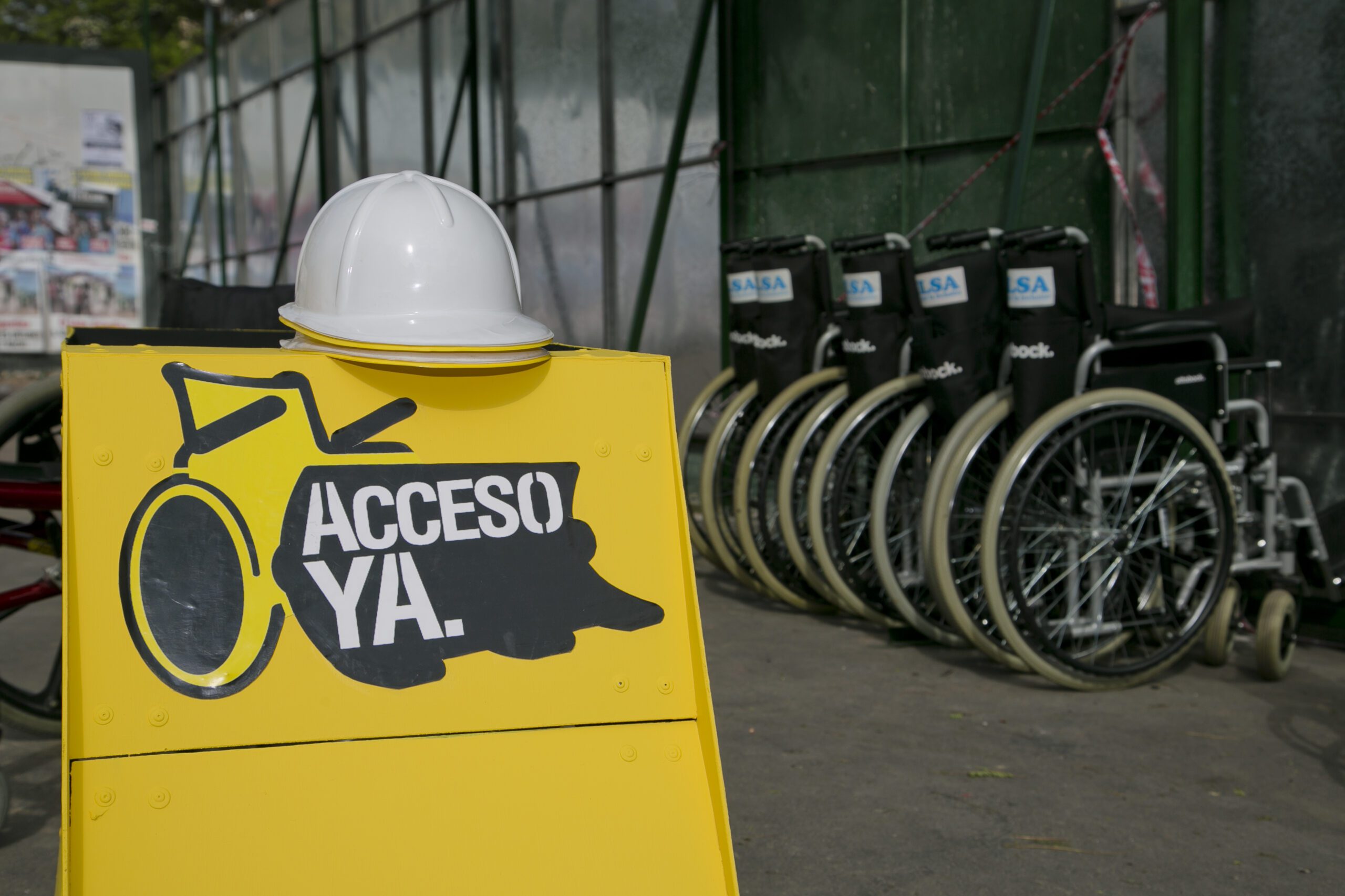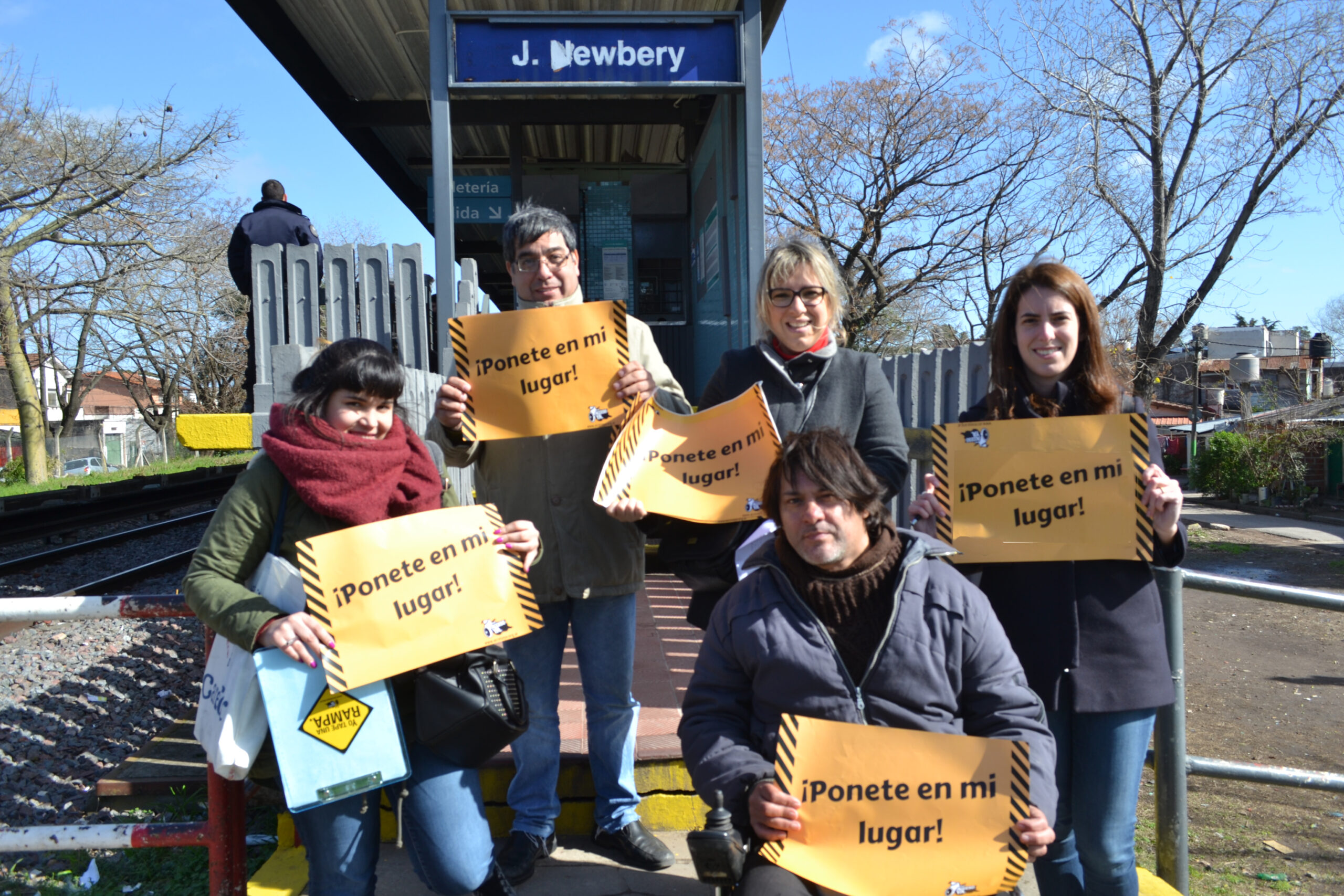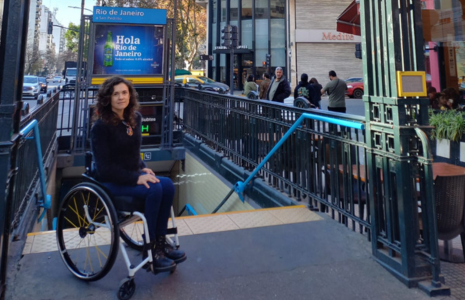Moving without barriers: the NGO that was born to guarantee access for people with disabilities
Acceso Ya offers legal defence for people with reduced mobility. It has 20 years of history and they achieved nearly 900 positive actions to eliminate barriers. Among the most frequent, ramps, escalators and adapted bathrooms stand out.


Por Paula Galinsky
“At 27 years old, I was diagnosed with muscular dystrophy and my life changed forever. Until that moment, I ran down and up the stairs and had never thought about the importance of a ramp for a person with reduced mobility”. This is said by Eduardo Rodríguez (57), who more than 25 years ago filed a claim for lack of accessibility at the Jorge Newbery station of the Urquiza train, located in Hurlingham, in the province of Buenos Aires.

That complaint led him to found the NGO Acceso Ya, which aims to include people with motor disabilities or reduced mobility through the legal defence of the right to accessibility.
From this civil association works to promote the elimination of architectural barriers and generate awareness campaigns in this line.
Although Eduardo presents himself as a casualty, he later recounts that today, after much work together, he became a volunteer for the NGO.
He says that after his diagnosis and for three years between 1997 and 2000, he was able to walk on crutches. However, over time the disease progressed and he had to start using a motorised wheelchair.
It was then that he encountered the first obstacles when he wanted to take courses in a training centre located in the town of Pablo Podestá. The train left him perfectly but the station closest to his house was not adapted and, for this reason, he could not use it.
“I didn’t study because I couldn’t travel. I couldn’t work because, unfortunately, I couldn’t get there. The same thing started to happen to me when I wanted to join the awareness activities as a volunteer for Acceso Ya”, he said.
For this reason, a claim began against the concessionaire of the General Urquiza Railway Line, asking them to build a ramp at the Jorge Newbery station.
“Something so simple but rather tedious to achieve: a ramp to be able to climb the station autonomously and safely, as set out in the National Accessibility Law (N° 24.314). A ramp not only for me but also for elderly neighbours, pregnant women and children,” says Eduardo.
NGO


Accessibility means that all people have the possibility of using public and private spheres to develop their economic, social, cultural and individual potential.
Acceso Ya is already convinced that access to physical spaces is the starting point to exercising rights and freedoms on equal terms, live independently and achieving the full development of one’s personality.
María Josefina Macías, coordinator of Acceso Ya, explains that they are looking “to raise social awareness of the importance of taking the place of others and respecting the right to access the physical environment in conditions of safety, comfort and autonomy, and the possibility of staying in both public and private places”.
The organization was born in a case of discrimination: In 2001, the airline Southern Winds did not allow passengers with disabilities to fly within Argentina because they did not have escorts. It was based on an operational manual which, as confirmed by the Justice in 2004, contained discriminatory clauses and its immediate replacement was ordered.
In order for justice to reach that conclusion, the victim had to take action, something not everyone has the possibility of doing. This background made it clear that people with disabilities who cannot access a lawyer are unable to enforce their rights. For this reason, Acceso Ya was created, the only NGO in Argentina dedicated exclusively to the theme of physical accessibility.
The institution is not for profit and has been working on this issue for more than 20 years without receiving any funds or state subsidies. They have already achieved nearly 900 positive results in different areas of intervention, such as schools, universities, cinemas, theatres, sidewalks, and public and private buildings. Among its main tasks, the improvement of transport conditions is highlighted.
Eduardo’s case


Since March 2019, Acceso Ya has been working on a legal case to achieve physical accessibility throughout the Urquiza train line. The claim includes Jorge Newbery station.
In November of that year, they obtained a precautionary measure to ensure the concessionaire of the service guaranteed access to the station Jorge Newbery. Currently, the two platforms have ramps.
However, María Josefina clarifies that the situation has not yet been resolved: “We are continuing to work on a construction plan that will include the other stations that are not yet accessible”.
Sofia is still waiting


In a similar fight is Sofía Bernasconi (45). “At 19 I had a spinal cord injury so I use a wheelchair to move. After months of rehabilitation after my accident, I found myself with a lot of architectural barriers: broken paths, broken ramps, places where there was no accessibility”, she shares.
“Today I work in a bank and I have to go every day from the neighbourhood of Almagro to Plaza de Mayo, in downtown Buenos Aires. This journey, which could take 25 minutes by subway to me, takes more than an hour”, she warns.
She lives two blocks from the Rio de Janeiro subway station on line A, but cannot use it because it is not wheelchair-friendly. “It has no lifts or escalators in any of its income. So I have to take a bus that takes much longer,” she says.
“Together with Acceso Ya, we make the corresponding claims. They told us that the station adaptation works are planned in a 20-year work plan. Crazy!”, she adds and assures that they will continue to insist.
How to help
To learn more about Acceso Ya and collaborate, you can go to https://accesoya.org.ar/.


